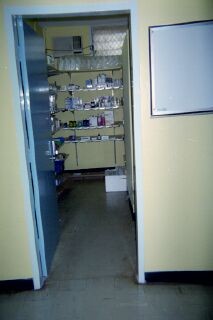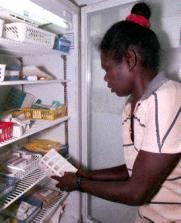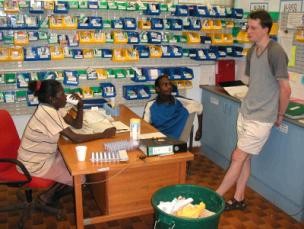|
There
are times when problems are encountered in providing pharmaceutical
care for a remote and isolated Aboriginal community that one wonders
how the same problem was dealt with in the "mainstream"
pharmacy situation.
In
looking for an answer it is found that it has not been dealt with
there and is still a problem.
So maybe the solving of the problem can be used as a template
for the urban pharmacy counterpart.
  Left: Left:
The pharmacy -
the second smallest room in the clinic at Pirlangimpi on Melville
Island
|
Above:
The uninviting entrance to the pharmacy
of the health clinic at Nguiu, Bathurst Island
in August 2001
|
.
The message
of the month is that pharmacy and pharmacists are not seen by
other clinicians in a health clinic setting as anything more than
"pick and lick" checkers of things that require checking
because the law says so.
Now that is
a bit disconcerting but accepted because the pharmacist has not
been around in a remote health clinic setting before to have created
any other impression.
It comes from the fact that "pharmacy" was supplied
from a distant hospital and never meant much more than an order
having to be done once a month and delivered a couple of weeks
later.
So how and
why do we want the problem solved?
Simply because
we know there are areas where an improvement in the quality use
of medicine could lead to better health outcomes and therefore
a longer life expectancy for Australia's Aboriginal people.
We know there
are areas of involvement for a pharmacist BUT the clinical team
is not so aware. This was evident when the pharmacist was excluded
from the "guest list" for a workshop on chronic disease
despite approaches to say he/she pharmacist/graduate) would like
to attend.
  Left: Left:
Linda Pupangamirri selects
a product to dispense
Right:
Damien Rixon, Linda Pupangamirri and Joachim Tipiloura in the
enlarged pharmacy at Nguiu in February 2003
The Tiwi pharmacy
project has reached a point where the supply function is in place
and it can now concentrate on the wider areas. In order to find
those areas it is only a matter of looking at how well pharmaceutical
care is being practiced in the "market place" - that
is "consumer land" and DO something - don't just talk
about it.
So where to
start?
The following should give a lead:
1. There is a 40% pick up rate of Websterpaks by patients on weekly
medication long term regimes
2. There are patients who do not know what their medicines are
for let alone how they work
3. There are Aboriginal Health Workers asking for clinical therapeutic
knowledge
4. There are doctors keen to do medication reviews
5. There are clinical trials happening in the communities keen
to have pharmacist involvement.
It is hoped that by example the pharmacy operation will be able
to lift itself in the minds of other clinicians.
A sample of clinicians will be interviewed for a benchmark reading
of "clinical pharmacist awareness".
|

